During the semester, I shall post course material and students will comment on it. Students are also free to comment on any aspect of media politics, either current or historical. There are only two major limitations: no coarse language, and no derogatory comments about people at the Claremont Colleges.
Monday, September 30, 2019
Media Organization, Titles, and Routines
Encountering Digital News
An example of tracing a story back.
Evolving organizational model for newspapers
Broadcast Titles
Story selection
Getting Information
- This year, for the first time, US adults will spend more time using their mobile devices than they will spend watching TV, with smartphone use dominating mobile time.
- Media platform use (update to p. 107 of Graber)
- Online journalism is more personal and direct than print journalism, narrating key social and policy issues through very personal frames and subjective references.
An example of tracing a story back.
Evolving organizational model for newspapers
Broadcast Titles
- Anchor: One in the television studio who ties together the newscast by reading the news and providing transitions from one story to the next.
- Executive Producer: The television executive with overall responsibility for the look of the television newscast.
- Field Producer: Behind-the-scenes television reporter who often does much of the field work for a network's on-camera correspondents.
- Network Correspondent: A television reporter who delivers the news on camera. Network correspondents may or may not do the actual news-gathering for their stories.
- Show Producer: Television news specialists who produce individual newscasts and report to the executive producer.
Getting Information
Sunday, September 29, 2019
Whistleblower Writes Well
Article written by director of Harvard Writing Center and article shared on Facebook by director of CMC's Writing Center.
https://www.nytimes.com/2019/09/27/opinion/whistleblower-complaint.html
Pointers from the article:
https://www.nytimes.com/2019/09/27/opinion/whistleblower-complaint.html
Pointers from the article:
The whistle-blower gets right to the point.
The whistle-blower uses subheadings to make sure we can connect the dots.
The whistle-blower gets an A for his topic sentences.
The whistle-blower uses active verbs.
Friday, September 27, 2019
College Paper Breaks Big Story -- and Gets Credit!
Jay Shaylor and Evan Perez at CNN:
Nicholas Bogel-Burroughs at The New York Times:
Kurt Volker, US special envoy to Ukraine, has resigned one day after the release of a whistleblower report alleging a coverup by the White House of a call between President Donald Trump and Ukraine's President, three sources familiar with the matter confirmed to CNN.
Volker was named in the report. The State Department has not returned messages seeking comment.
The State Press, the school paper of Arizona State University, first reported Volker's resignation.
Nicholas Bogel-Burroughs at The New York Times:
Kurt D. Volker has traveled halfway around the world as a United States diplomat. He has met with world leaders, negotiated foreign policy and served under multiple American presidents.
But when he abruptly resigned from his job as the State Department’s special envoy for Ukraine, it wasn’t an international broadcaster or national newspaper that had the scoop.
It was a 20-year-old junior at Arizona State University who broke the news in the school’s student newspaper.
Mr. Volker serves as executive director of the McCain Institute, a think tank in Washington that is run by Arizona State University. When reporters at the student newspaper, The State Press, discovered the connection, they began looking into Mr. Volker and, on Friday evening, confirmed with an unnamed school official that the ambassador had resigned.
Andrew Howard, a managing editor of The State Press, said he hadn’t set out to write a story that would be followed by reporters from dozens of major media outlets, including The New York Times. He had just been doing his job: covering the university.
“I didn’t take a different approach to this story than any other,” Mr. Howard said shortly after waking up to a flood of congratulatory texts on Saturday morning. “Everyone’s looking for an ‘aha’ moment that I don’t think was there.”
Wednesday, September 25, 2019
More on national outlets stealing local outlets' scoops
Here's another example of a national media outlet reporting on a local media outlet's scoop and not giving them credit. My hometown newspaper, The Davis Enterprise, broke the news of Iranian students being barred from boarding U.S.-bound flights on Sept. 17. The New York Times picked up the story two days later and didn't give credit to the local reporter. They eventually did, however, after some backlash on Twitter.
Tweet: https://twitter.com/calebmhampton/status/1175208738455769088
Mr. Abdollahpour’s account was published in The Davis Enterprise, a California newspaper, earlier this week.
https://www.nytimes.com/2019/09/20/us/iranian-students-visas.html
https://www.davisenterprise.com/local-news/iranian-ucd-student-among-those-barred-from-entering-u-s/
Tweet: https://twitter.com/calebmhampton/status/1175208738455769088
Mr. Abdollahpour’s account was published in The Davis Enterprise, a California newspaper, earlier this week.
https://www.nytimes.com/2019/09/20/us/iranian-students-visas.html
https://www.davisenterprise.com/local-news/iranian-ucd-student-among-those-barred-from-entering-u-s/
Press Freedom, Consolidation, News Deserts, and Ghost Papers
Op-Eds
Freedom of Press Redux
- The Op-Ed Project and its advice
- Think about ethos from rhetoric. Why do you have the standing to write this piece? Example
- NYT Tips
- LAT and submission page
Freedom of Press Redux
- The First Amendment: Congress shall make no law respecting an establishment of religion, or prohibiting the free exercise thereof; or abridging the freedom of speech, or of the press; or the right of the people peaceably to assemble, and to petition the Government for a redress of grievances.
- Opinion on government control
- The Doctrine of Prior Restraint and gag orders
- Copyright
- Defamation
- Who really uses FOIA? (Hint: it ain't Woodward and Bernstein).
- The United States is unusual in its protection of free speech.
- Comparative analysis of press freedom
Media Barons and News Deserts


- One response: Patch (example from Montrose-La Crescenta)
Monday, September 23, 2019
Ownership and Control of the Media
The Chomsky View:
Terms (Graber 32-35)
IMPORTANT: WHEN YOU ANALYZE A NEWS STORY, YOU MUST DETERMINE WHETHER IT ORIGINATED WITH A WIRE SERVICE.
TV and Radio
The Big Board
/cdn.vox-cdn.com/uploads/chorus_asset/file/16352112/Media_landscape_june_2019_desktop.png)
Ownership Data (see Graber 36-37):
The FCC:
Terms (Graber 32-35)
- Independents
- Chains
- Cross-Media
- Conglomerates
IMPORTANT: WHEN YOU ANALYZE A NEWS STORY, YOU MUST DETERMINE WHETHER IT ORIGINATED WITH A WIRE SERVICE.
TV and Radio
- Networks and stations
- Affiliates and "owned and operated" stations
Cable
- Cable networks v. cable carriers
/cdn.vox-cdn.com/uploads/chorus_asset/file/16352112/Media_landscape_june_2019_desktop.png)
Ownership Data (see Graber 36-37):
- Columbia Journalism Review guide to media ownership
- Public Broadcasting
- African American and Hispanic Media
- The case of Sinclair
The FCC:
- Licensing and FCC Ownership Rules
- Equal Time
- Fairness Doctrine (defunct)
Talk Radio (from an Annenberg Public Policy Center report):
- In 1980s, satellite dishes enabled high-quality instant distribution
- 1-800 number that made the interactive national program possible.
- "The end of the fairness doctrine paved the way for talk radio as we know it today. Neither hosts nor stations currently have an obligation to provide balance or voice to competing views."
Freedom of Speech
- The First Amendment: Congress shall make no law respecting an establishment of religion, or prohibiting the free exercise thereof; or abridging the freedom of speech, or of the press; or the right of the people peaceably to assemble, and to petition the Government for a redress of grievances.
- Opinion on government control
- The Doctrine of Prior Restraint and gag orders
- Copyright
- Defamation
- Who really uses FOIA? (Hint: it ain't Woodward and Bernstein).
- The United States is unusual in its protection of free speech.
- Comparative analysis of press freedom
Sunday, September 22, 2019
Out of site, out of mind
In the "Public Surveillance" section of this week's reading, Graber and Dunaway discuss the power of the media to determine what issues will become important to the public and which issues will be largely ignored. This made me think of the contrast in immigration policies between the Obama and Trump administrations. Although President Trump has certainly amplified the humanitarian crisis at the border and implemented abusive policies such as systematically separating children from their parents, some of the damaging policies taking place at the boarder preceded the Trump Administration. For instance, the practice of "kids in cages" is not new. I'm not pointing this out in defense of Trump-- let me emphasize again, his immigration policies are damaging and abusive; however, I think that this is an important reminder in the context of this chapter. As Graber and Dunaway write, "[C]onditions that might be tolerated in obscurity can become intolerable in the glare of publicity". It is definitely good that these issues have come into "the glare of publicity"-- people are paying attention and fighting against these policies now, but the fact that some of these policies are not new serves as a reminder that just because we don't hear about it doesn't mean that there isn't a problem. If we'd been paying attention five years ago, how would the world look different now?
How much control does Jeff Bezos exert over the Washington Post?
I was interested in the Washington Post's oversight dynamic after reading more about Jeff Bezos and his decision to privatize the company. Publicly traded corporations in the media field often lay off reporters to increase profits to please their shareholders and answer to Wall Street, so I think that the independence of the media ownership in Jeff Bezos is really intriguing because the Post has shedded a group that other news outlets are still accountable to.
But how does the individual ownership influence media coverage by the Washington Post?
One of the most interesting aspects of investigating this question is the similarity of attacks by both Bernie Sanders and Donald Trump against the Washington Post's coverage of them individually.
In a speech last month in New Hampshire, Bernie Sanders attributes his unfavorable coverage in the Washington Post to his frequent attacks on Amazon's tax payments. CNN headlines the video "Bernie Sanders makes Trump-like attack on Washington Post" and features a response from Executive Director Marty Baron (who Bezos retained in the organization after his purchase) emphasizing the full independence that Bezos grants the Washington Post.
Similarly, the Washington Post finds itself a frequent scapegoat from President Trump for his negative coverage, with his frequent tweets deriding the "Amazon Washington Post". Given Trump's oversight of the FCC, his relationship with the media and specific media outlets can potentially have effects on far-reaching policies. But does he have any power to make moves against the Washington Post?
Another interesting part of this story is that outlets like Fortune have reported on the negative coverage of Amazon in the Washington Post as evidence that Jeff Bezos lacks control over the coverage of the Post.
What are the implications of privately owned media companies? Will there be similar criticism of Salesforce CEO Marc Benioff's purchase of TIME Magazine?
But how does the individual ownership influence media coverage by the Washington Post?
One of the most interesting aspects of investigating this question is the similarity of attacks by both Bernie Sanders and Donald Trump against the Washington Post's coverage of them individually.
Similarly, the Washington Post finds itself a frequent scapegoat from President Trump for his negative coverage, with his frequent tweets deriding the "Amazon Washington Post". Given Trump's oversight of the FCC, his relationship with the media and specific media outlets can potentially have effects on far-reaching policies. But does he have any power to make moves against the Washington Post?
Another interesting part of this story is that outlets like Fortune have reported on the negative coverage of Amazon in the Washington Post as evidence that Jeff Bezos lacks control over the coverage of the Post.
What are the implications of privately owned media companies? Will there be similar criticism of Salesforce CEO Marc Benioff's purchase of TIME Magazine?
Friday, September 20, 2019
First Assignment, Fall 2019
Choose One
1. Pick any news event (e.g., speeches, press conferences, Sunday morning talk shows) since January 1, 2018 for which you can get a full transcript, recording, or video. Read the coverage of that event in three major mainstream news sources (e.g., New York Times, Politico). How did each define the story? On what sources did the stories draw? Did any miss something important? Explain in light of the papers’ audiences, constraints, and organizational processes. Among other sources, you may find transcripts at:
- Nexis Uni (from Honnold Library database menu)
- http://www.whitehouse.gov
- https://www.supremecourt.gov/oral_arguments/oral_arguments.aspx
- https://www.defense.gov/Newsroom/Transcripts/
- https://www.c-span.org/
3. Consider how the federal government regulates media ownership, access or expression. (See Graber, ch. 2-3.) Choose a current legislative proposal to change or reform this regulation (e.g., a federal shield law). Explain why this proposal should or should not become law.
4. Write a case study of post-2017 citizen journalism (Graber, pp. 124-125). That is, explain how material posted online by a non-journalist (e.g., blog posts, tweets, YouTube videos) drove coverage by the mainstream media. In the specific case that you choose, explain whether the effect was harmful or beneficial.
5. Write an op-ed on any topic that we are discussing. The op-ed should run no more than three pages. You may add a fourth page, discussing strategy for publishing it. Tell where you would submit it, and why you think it could win acceptance. If you succeed in publishing this op-ed, you will get an A for this assignment. (To qualify for the auto-A, it must appear in a legitimate, professional news outlet. Blogs, newsletters, and student publications do not count.) Click here for an example from 2005.
----------------------------------------
- Essays should be typed (12-point), double-spaced, and no more than three pages long. I will not read past the third page. (Exception: option #5, where you should add a short explanation of placement strategy).
- Please submit all papers in this course as Word documents, not pdfs.
- Cite your sources. Please use endnotes in the format of Chicago Manual of Style. Endnotes do not count against the page limit. Please do not use footnotes, which take up too much page space.
- Watch your spelling, grammar, diction, and punctuation. Errors will count against you.
- Return essays to the class Sakai dropbox by 11:59 PM on Friday, October 4. Essays will drop one gradepoint for one day’s lateness and a full grade after that.
Thursday, September 19, 2019
Wednesday, September 18, 2019
Media History IV
Crack: This video quotes Dr. Chasnoff (see Campbell, 169, 176).
The example of autism:

The example of autism:
Disasters and Breaking News
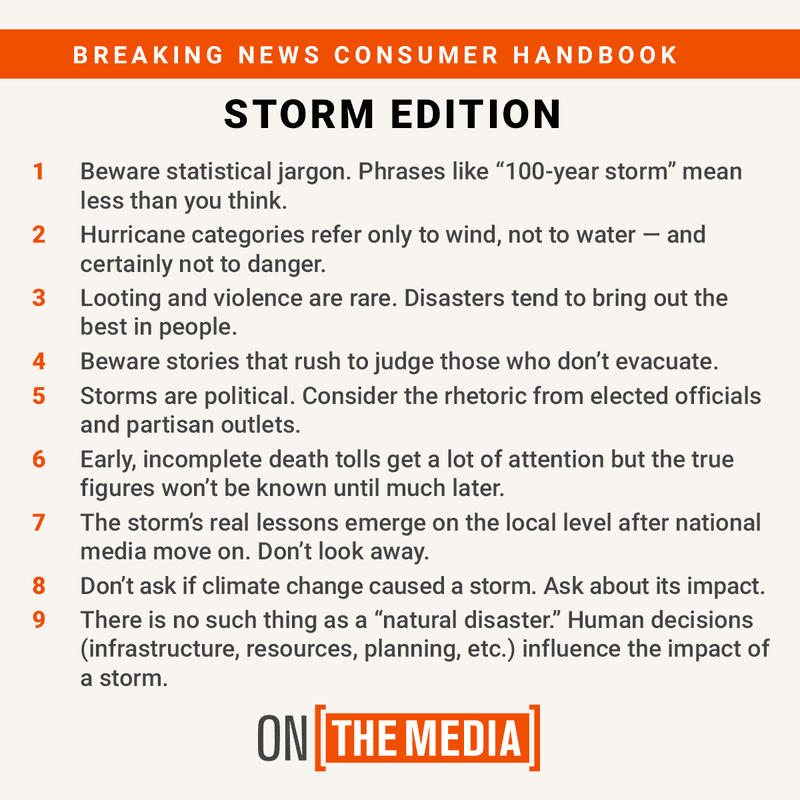
A Changing Media Landscape
Cable rises

The Internet
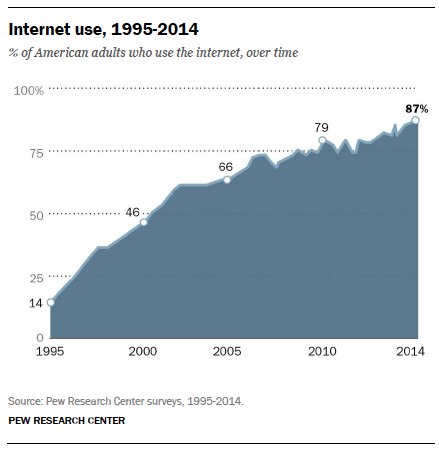
Newspapers: Bad Times
Jobs
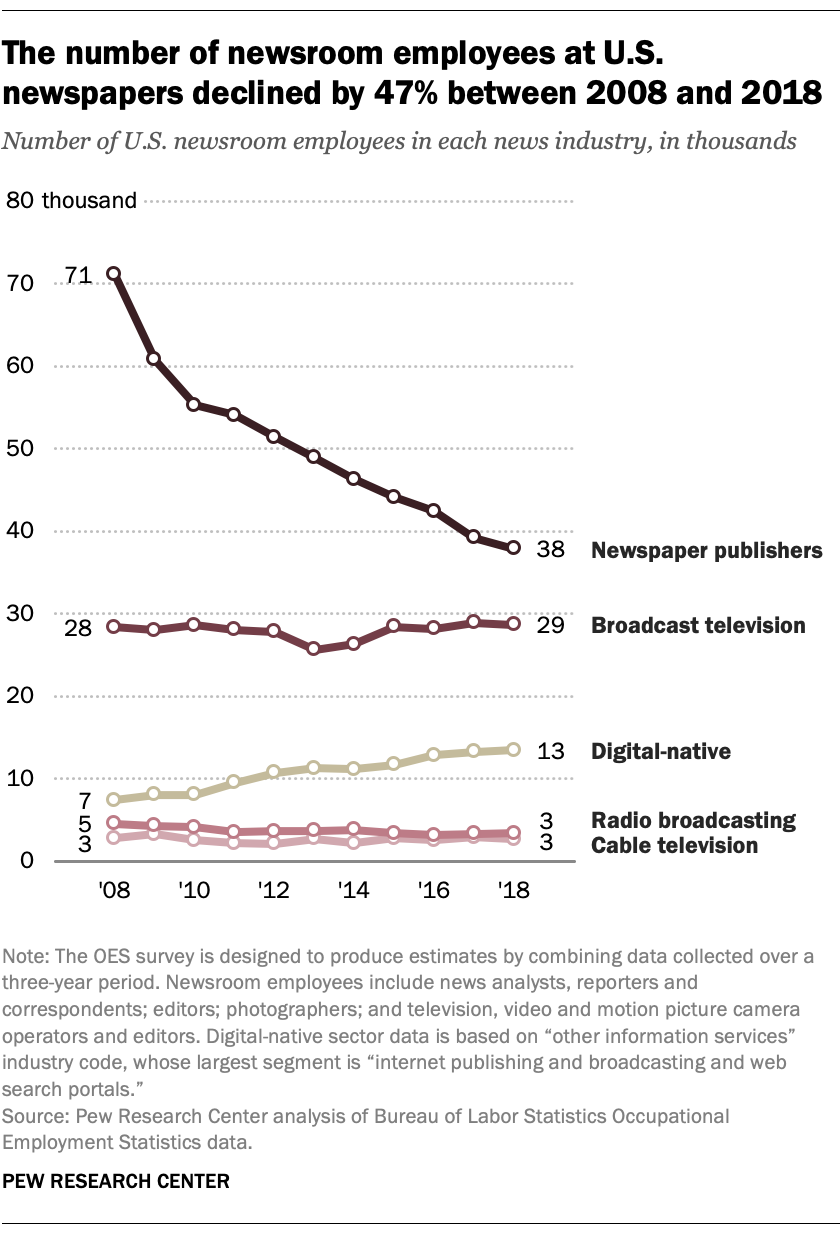
The hits keep coming:

A Changing Media Landscape
Cable rises
- 1979: C-SPAN
- 1980: CNN
- 1996: MSNBC
- 1996: Fox
And then...

The Internet

Newspapers: Bad Times
Jobs

The hits keep coming:
Tuesday, September 17, 2019
After we get it wrong
It's no joke when I say that I learned about six of these twelve media-driven myths in history class.
It seems to be a common thread that, if something was incorrectly reported and became overblown, there was little done in terms of reparation.
I, personally, connected with the story of media-hyped "global cooling" phenomena, which family members of mine cite to this day as proof that global warming is a media-perpetrated myth.
So, in a time when it is so easy to inflate a story due to the massive quantities of data created every second, how do we fix this? Who is "we?" How do we correct these errors for older generations who aren't in school and have absolutely no reason to change their opinions but still have the right to vote?
It seems to be a common thread that, if something was incorrectly reported and became overblown, there was little done in terms of reparation.
I, personally, connected with the story of media-hyped "global cooling" phenomena, which family members of mine cite to this day as proof that global warming is a media-perpetrated myth.
So, in a time when it is so easy to inflate a story due to the massive quantities of data created every second, how do we fix this? Who is "we?" How do we correct these errors for older generations who aren't in school and have absolutely no reason to change their opinions but still have the right to vote?
Napalm Coda
After Gabe asked his excellent question about the officer-turned-minister who claimed responsibility for the napalm attack (Campbell, ch. 8), I sought information about motivations. The question remains murky, but this 1997 story provides some detail:
Military historians say it's probably impossible to know for sure how big a role Plummer played in the attack.
"I got the feeling he was putting a lot of guilt on his shoulders when he may have just been a cog in a wheel," said Dale Andrade, an Army historian with the Center for Army and Military History. So far, Kim Phuc has tried to remain outside the debate, saying only that she supports Plummer in his message of reconciliation. "Whether or not he played a major role or a minor role, the point is I forgive him," said Kim Phuc, 34, who now lives in Toronto.
Trump on Facebook
At Now This, Judd Legum (Pomona `00) talks about Trump and Facebook:
Trump might be known for his tweets, but Facebook is taking priority in the aggressive digital strategy for his 2020 campaign.— NowThis (@nowthisnews) September 16, 2019
For more of @JuddLegum’s research and reporting, sign up for his newsletter at https://t.co/e48s0afp4D pic.twitter.com/rXggQVPisX
Monday, September 16, 2019
Media History III
Quick: without looking, do you know who the "big three" (CBS, NBC, ABC) evening news anchors are today? (answer)
Newspapers: peaking in the 1970s
The Cronkite Moment
What was the real story behind the "Napalm Girl" photo?
Vietnam: US Military Deaths by Year:
1964
|
206
|
1965
|
1,863
|
1966
|
6,144
|
1967
|
11,153
|
1968
|
16,589
|
1969
|
11,614
|
By June 1972, America has almost completed withdrawal from Vietnam:

Gallup data on Vietnam
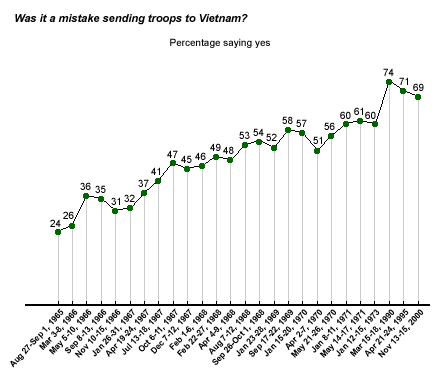
KIM PHUC TODAY
The Buchwald "bra-burning" column as it appeared in The Toledo Blade. How did thestory reflect then-pervasive attitudes toward gender roles?
Did The Washington Post uncover Watergate? Compare and contrast Watergate with later scandals that the media covered.
It did not happen all at once:
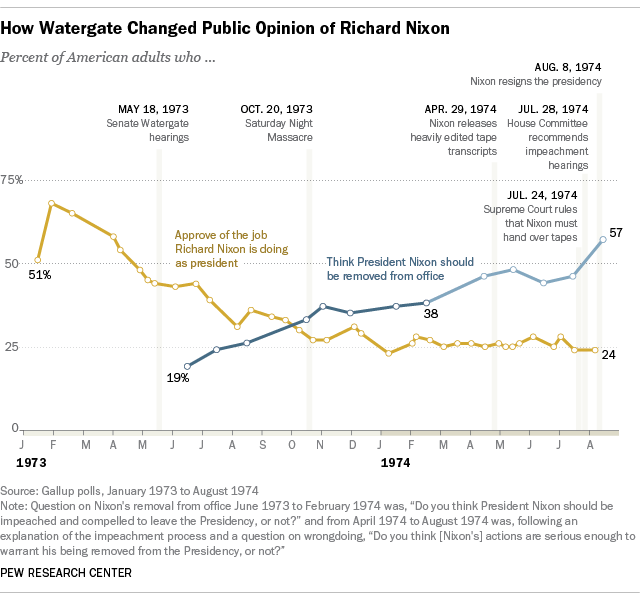
Responsibility of the Media
When reading Campbell's rationale for why the 'Bra burning' narrative persisted for so long, he suggests that the media did this to label this women's liberation movement as "trivial and primitive". The word primitive always brings about the worst of connotations (including Joseph Conrad's famously racist Heart of Darkness.) With media perception already in mind, this reminded me of how black families were described in Hurricane Katrina. In the midst of the chaos, many families of all races took actions deemed necessary to survive. However, the media perpetuated the tired 'primitive black criminal' narrative while allowing white families the 'survivor' narrative. This was especially brought to light in Kanye West's comment on Hurricane Katrina during a Hurricane Relief telecast. In this, he alludes to the very real implications of media gatekeeping. This includes the Danziger Bridge Shooting and Algers Point shooting. Through reading Campbell, we know that the media is significantly less powerful than our society thinks they are. However, can we shift this blame off of media completely?
Wednesday, September 11, 2019
Cameras have become the friend of older candidates
Reading Campbell's analysis of media coverage following the first Kennedy-Nixon debate made me draw some parallels to the 2020 Democratic primary debates and the various candidates campaigns in general. What stood out to me the most was discussion of the candidates age. For instance, Campbell cites a line from an article written by prominent columnist Walter Lippmann following the debate in which Lippmann observed that the cameras "made him [Nixon] look sick... and older and more worn than he is" (P. 75). Between the ten candidates who have qualified for tomorrow's debate, age has also been a widely discussed topic. The three candidates polling the best (Warren, Sanders, and Biden) are all over the age of seventy, while several of their opponents, most notably Buttigieg, tout their youth as a strong selling feature to voters with talk of generational change and passing the torch. However, today's older candidates, unlike Nixon, have had time to figure out how to use cameras to their advantage when it comes to age: Elizabeth Warren is caught running places so often that it has become a meme and Bernie Sanders often takes time out of his busy campaign schedule to play sports. Age is definitely still an issue in modern campaigns, but today most successful older candidates have mastered using the camera as a tool to show off their health, stamina, and inner youth.
Trump and 9/11
No, he did not have the tallest building in lower Manhattan.
As an alum of this class reported, he got federal money after 9/11. He claimed it was for helping victims. It wasn't.
He said that he personally helped out at Ground Zero. No one saw him do it.
He also claimed that he saw "thousands" of Muslims in New Jersey celebrating the attack. He didn't.
History of Media II
Percentage of Household with TV
1950....9.0
1951...23.5
1952. .34.2
1954.. 55.7
1955.. 64.5
1956.. 71.8
1957 ..78.6
1958 ..83.2
1959 ..85.9
1960 ..87.1
1961 ..88.8
1962 ..90.0
1963.. 91.3
New York Times coverage of the Bay of Pigs
The assassination
Monday, September 9, 2019
Digital Media in the Modern World
That's an obtuse title and I hope that, by no means, it implies that I am an expert or believe I am an expert in this topic. Also, this is not written in consultation with The Elements of Style nor was it planned prior to creation so appreciate the ideas more than the expression, if you will. All thoughts and feelings reflected are my own. I am always looking for feedback and always willing to discuss and learn. **
I am currently taking a Digital Media Studies class and, on our first day, we discussed the differences between the terms digital and analog.
The root of digital being digit, a term originally used for fingers and toes before developing its more modern numerical meaning, suggests that for something to be "digital" it must be able to be manipulated. Analog, on the other hand, breaks down to mean "requiring thought" or "thinking through an idea."
Nowadays, however, these words define each other more than their actual definitions; think about the distinctions between a classic wall clock and an Apple Watch and you'll see what I mean. While many scholars on the topic have come to nicer-sounding conclusions about the distinctions between digital and analog, here's a brief summary of what the class came up with:
Digital- Faster, accessible, adaptable
Analog- Basic, inflexible, more time-consuming
This made me consider Professor Pitney's statements regarding initial reports of mass shootings: "The first reports are always wrong."
A far cry from the days of newspapers, journalists and every-day people can now use their phones and the internet to share information practically instantaneously. Historically, journalists were put on probation and often disgraced for misreporting information but in the era of live streams and Twitter, there seems to be less concern for delivering accurate information as opposed to fast information.
With digital media, news outlets can reach more people in less time which means that if false information is published, it has the ability to spread like wildfire; similar to the "Paul Revere Effect" discussed by Campbell in chapter two of Getting it Wrong but on a much larger scale. This, compiled with the fact that nothing on the internet truly goes away means that false claims can arise at any time. This is such a common phenomenon that we have created websites such as Snopes to debunk recurring hoaxes. I’m sure there is something to be said about journalism culture in this context- whoever puts out any information first will get the most attention- however, these digital technologies have made it easier to communicate information without placing much importance on veracity.
This scenario alongside modern mistrust of the media recalls the story of the media-driven myth about Orson Well's War of the Worlds radio broadcast; specifically how newspapers seemed to sensationalize the "mass panic" created by the production. It brings to mind the suggestion that newspapers were hypercritical and hyperbolic about the impacts of the broadcast because radio was dominating print media.
Creating public mistrust in a new medium that informs the public in real-time... Hmmmm... Sounds familiar.
In my experience, those who seem to criticize modern media the most seem to be those who still read the newspaper every day*- people who didn't grow up with the media being as prevalent and information being as accessible as it is currently. It may be that pre-millennial generations mistrust modern digital media because they were brought up in an era that placed journalistic integrity somewhere above the speed of communication. However, I catch glimpses of their lingering trust in my Great Grandmother's ridiculous Facebook Wall, filled with misinformation, sensationalist headlines, and racist/sexist/homophobic/fill-in-the-blank-ist memes that all do one thing: validate her opinions.
Clearly, that trust has stipulations. Stipulations reminiscent of the statements made by Hearst on page 15 of Getting it Wrong:
"Newspapers claiming to be conservative and reliable are the most untrustworthy of any on earth... Not always due to intention but more frequently to ignorance and prejudice."
As a southerner (who has escaped!), I feel like this mistrust of the media is what leads a lot of people back home to Fox News. My dad, an avid friend of the Fox and Friends friends, has frequently made similar jabs at the "Leftist Mainstream Media" for making jokes about and spending airtime laughing at what hosts see as the incompetencies of the current president and his administration. It seems to be relatively consistent that people do not criticize those that agree with them as Fox News is certainly no stranger to journalistic errors.
Now, this is where I start to think about McCarthyism and Ed Murrow. In response to the destructive media coverage of Joseph McCarthy, Gilbert Seldes was quoted as saying, "It is more important to use our communication systems properly than to destroy McCarthy," (Campbell 50). So, when the "Leftist Mainstream Media" jokes about or even reports on the downfalls of the Trump Administration, is it misuse of our communication systems? What is the media's role in reporting on the government and the issues within it? With politics everpresent in entertainment (SNL, Late Night shows, Veep, and POSE, to name a few) what is the media's role in portraying corruption and political controversy?
That was a very long-winded way to ask a question I don't know the answer to but maybe we can discuss and figure something out.
Thank you for coming to my Ted Talk.
- Kendall
* Sorry, Prof. Pitney; this is a generalization and is absolutely not directed at you.
** Why so many disclaimers? I'm from the South-Eastern United States and am accustomed to being attacked for expressing my political opinions!
Sunday, September 8, 2019
Friday, September 6, 2019
How Journalists Reach Out to Sources
These are the tactics used by the @WashingtonPost. @JeffBezos - you should be very proud... 🙄 pic.twitter.com/9RO91n7XGX— Eric Trump (@EricTrump) September 6, 2019
"By publicizing the email, Eric is also helping Farenthold publicize the contact information he is attempting to get into the hands of Trump Organization employees.">Eric Trump Encounters Journalism, Is Confused https://t.co/7kf2bZdVsj via @intelligencer— Brian Lowry (@blowryontv) September 6, 2019
History of Media I
Fake News, circa 1835: The Moon Hoax
Daily Newspaper Circulation in the United States:
1850
|
758,000
|
1860
|
1,478,000
|
1870
|
2,602,000
|
1880
|
3,566,000
|
1890
|
8,387,000
|
1900
|
15,102,000
|
1909
|
24,212,000
|
1919
|
33,029,000
|
1929
|
42,015,000
|
1939
|
42,966,000
|
Source: Historical Statistics of the United States, 810.
Example of Remington drawing (see p. 12) along with the myth (see p 16)
Households with Radio Sets:
1922
|
60,000
|
1927
|
6,750,000
|
1932
|
18,450,000
|
1937
|
24,500,000
|
1942
|
30,600,000
|
Source: Historical Statistics of the United States, 796.
(TERRIFIC BOOK ON EARLY BROADCASTING BY CMC ALUM SCOTT WOOLLEY)
Herb Morrison of WLS Chicago reports on the Hindenberg:
Households with Television Sets:
1946
|
8,000
|
1949
|
940,000
|
1952
|
15,300,000
|
1955
|
30,700,000
|
1958
|
41,924,000
|
Murrow speech 1958:
One of the basic troubles with radio and television news is that both instruments have grown up as an incompatible combination of show business, advertising and news. Each of the three is a rather bizarre and demanding profession. And when you get all three under one roof, the dust never settles. The top management of the networks, with a few notable exceptions, has been trained in advertising, research, sales or show business. But by the nature of the corporate structure, they also make the final and crucial decisions having to do with news and public affairs. Frequently they have neither the time nor the competence to do this. It is not easy for the same small group of men to decide whether to buy a new station for millions of dollars, build a new building, alter the rate card, buy a new Western, sell a soap opera, decide what defensive line to take in connection with the latest Congressional inquiry, how much money to spend on promoting a new program, what additions or deletions should be made in the existing covey or clutch of vice-presidents, and at the same time -- frequently on the same long day -- to give mature, thoughtful consideration to the manifold problems that confront those who are charged with the responsibility for news and public affairs.
Thursday, September 5, 2019
Wednesday, September 4, 2019
First Day News
We mentioned fake news. Now we have fake weather.
This article by Theodoric Meyer at Politico refers to stories that we shall read November 18-20:It is a violation of federal law to falsify a National Weather Service forecast and pass it off as official, as President Trump did here.— Dennis Mersereau (@wxdam) September 4, 2019
18 U.S. Code § 2074: https://t.co/jvROnpSJLI pic.twitter.com/TnIuvZRJoS
Definers Public Affairs is rebranding nine months after Facebook cut ties with the Republican consulting firm and as several of its top staffers leave to join a Washington lobbying firm.
Matt Rhoades, the Republican operative who ran Mitt Romney’s 2012 presidential campaign, is leaving Definers to become the co-chief executive of CGCN Group, a lobbying firm with ties to President Donald Trump’s White House and Republicans in Congress.
Rhoades is taking a number of Definers staffers with him, including Antonia Ferrier, a former aide to Senate Majority Leader Mitch McConnell (R-Ky.). Meanwhile, Joe Pounder, the GOP operative who co-founded Definers with Rhoades in 2015, has bought out Rhoades’ stake in Definers and has rebranded the firm as Bullpen Strategy Group.
The changes come less than a year after The New York Times detailed how Definers used “campaign-style opposition research” tactics to target Facebook’s rivals, including senators investigating the social network — a move that deeply irked some lawmakers. Facebook severed its ties to Definers shortly after the Times story ran.
The Beginning
ALUMNI OF THIS CLASS WORKING IN JOURNALISM (partial list):
BUT IF YOU ARE PLANNING ON A JOB AS A JOURNALIST, SOME ITEMS TO CONSIDER:
From Pew:
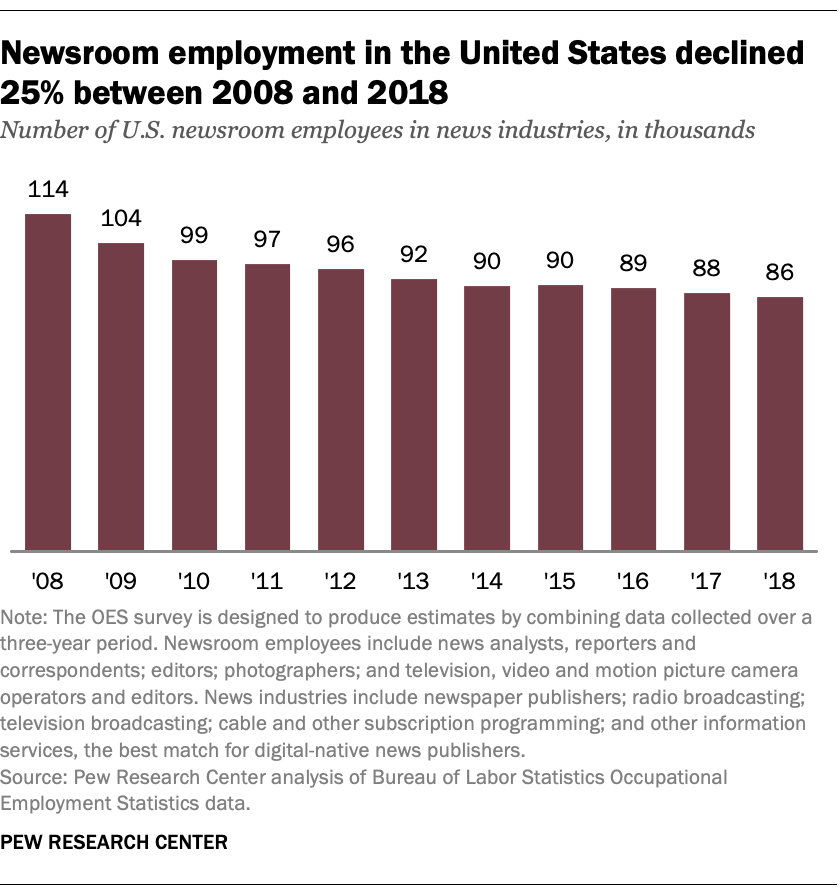

Other jobs in communications:
At Axios, Andrew Witherspoon has a chart showing the rapid decline in online interest after a mass shooting.

BUT IF YOU ARE PLANNING ON A JOB AS A JOURNALIST, SOME ITEMS TO CONSIDER:
From Pew:


Other jobs in communications:
At Axios, Andrew Witherspoon has a chart showing the rapid decline in online interest after a mass shooting.

Subscribe to:
Posts (Atom)
